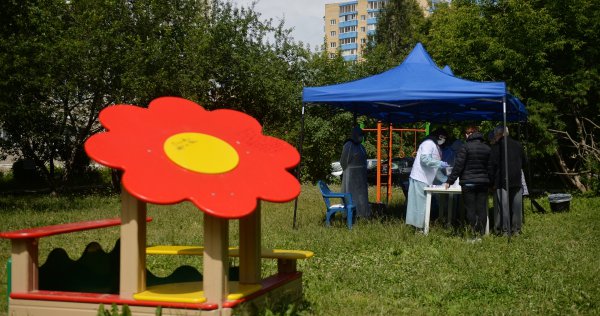
Over the past month, the Kremlin’s proposed constitutional referendum has dominated the political agenda in Russia. The proposed changes, among other points, would allow President Vladimir Putin to stay in power past his current term.
After Putin announced that the vote, previously set for April, would take place on 1 July, regional authorities began removing quarantine restrictions. It seems they’re not compatible with celebrations for the new edition of the constitution. Miraculously, the official statistics for coronavirus infections began to improve simultaneously, provoking concerns over falsification and tampering from some experts. Regardless, the coming plebiscite has won over public discussion and even taken over from the pandemic. The referendum is widely discussed online. More than 80% of Russian citizens knew about the vote two weeks in advance, polls say.
Yet Russia’s debate on the constitutional amendments has clearly not evolved how the Kremlin planned. There’s practically no broad discussion over the content of the amendments. Instead it’s the fact that every day more evidence emerges of an aggressive campaign to force employees in Russia’s public sector – and companies loyal to the Kremlin – to vote. Certain regions are voting online – the first time an electronic voting system is being used at this scale in Russia. But still, the focus is increasingly on “administrative mobilisation” and how it affects millions of people across the country.
Of course, the use of public sector workers in Russia’s elections are nothing new. Every election involves mobilising a “reliable electorate” to ensure turnout numbers and the right result. But the pressure and manipulation ahead of the referendum differs from previous elections – not by methods, but scale. This time, the Kremlin’s political technologists have clearly tried to go outside of the reliable public sector electorate and bring in people they’d previously left alone.
The reason and the potential results of this phenomenon are linked: without mobilising “loyal” voters it’s practically impossible to get an appropriate turnout for a national referendum in Russia, but the administrative machine can burnout at a grassroots level – and play an evil trick on its owner.
Old methods scaled up
On 18 June, a Moscow school teacher, Alexey Galin, wrote on Facebook that school management was pressuring him after he refused to register for online voting in the referendum – he posted about it on an online map of voting violations. “Today, the deputy principal visited. And said that it’s a catastrophe. The principal is being forced out. It’s a catastrophe, basically,” Galin wrote.
This is a familiar situation for Russian school teachers. Ahead of elections, the principal sends a request to all school employees to “register themselves and report back” – as the principal is expected to send a list of people who have registered to the department of education. But when one teacher doesn’t think this is normal and sends a complaint to the central election committee, the school management quickly becomes angry, accuses the individual of shaming the school, and promises consequences.
Galin’s post was shared widely, and the next day school management apologised, withdrew its request to the teacher and explained that this was “purely personal” initiative by the deputy principal, and was in no way connected with the education department.
It’s hard, however, to believe that this was a “personal initiative”. Across Russia, independent trade unions and politicians have been receiving an endless stream of identical complaints about forced registration and voting at workplaces. This is why a local community in Zyuzino, Moscow (disclaimer: the author is a member of the group) launched an anonymous complaints box, which has received dozens of complaints so far.
Here’s an example:
“They didn’t threaten [us] with problems, but the bossy tone forces the majority of people to register [to vote]: ‘Colleagues, we need to reach 100% of our co-workers who have applied to register to vote online… For people not from Moscow you need to apply to vote for constitutional amendments at the polling station at address XXX […] I have to account for everyone by name. Deadline is 4pm on 11.06.2020.”
Most of the time, mobilisation happens via gentle requests from management to send photos of registration and voting documents, without direct threats of firing or wage cuts. Sometimes, management forces workers more directly (and rudely). Subordinates aren’t just ordered to register to vote, vote and then send evidence of the vote, but also bring with them three other people to vote.
This may be a violation of Russia’s labour code, and the criminal code on electoral rights, but many people don’t realise this forced mobilisation is against the law, nor are there any public legal precedents to go by.
In certain cases, the pressure on teachers finds its way into parents’ chat groups, where teachers, it seems, think that pushing people to vote is the same as the semi-legal informal fees charged for repairing classrooms and school trips.
PrintAlexander Zamyatin | Radio Free (2020-06-27T00:00:00+00:00) Russia’s forced referendum. Retrieved from https://www.radiofree.org/2020/06/27/russias-forced-referendum/
Please log in to upload a file.
There are no updates yet.
Click the Upload button above to add an update.